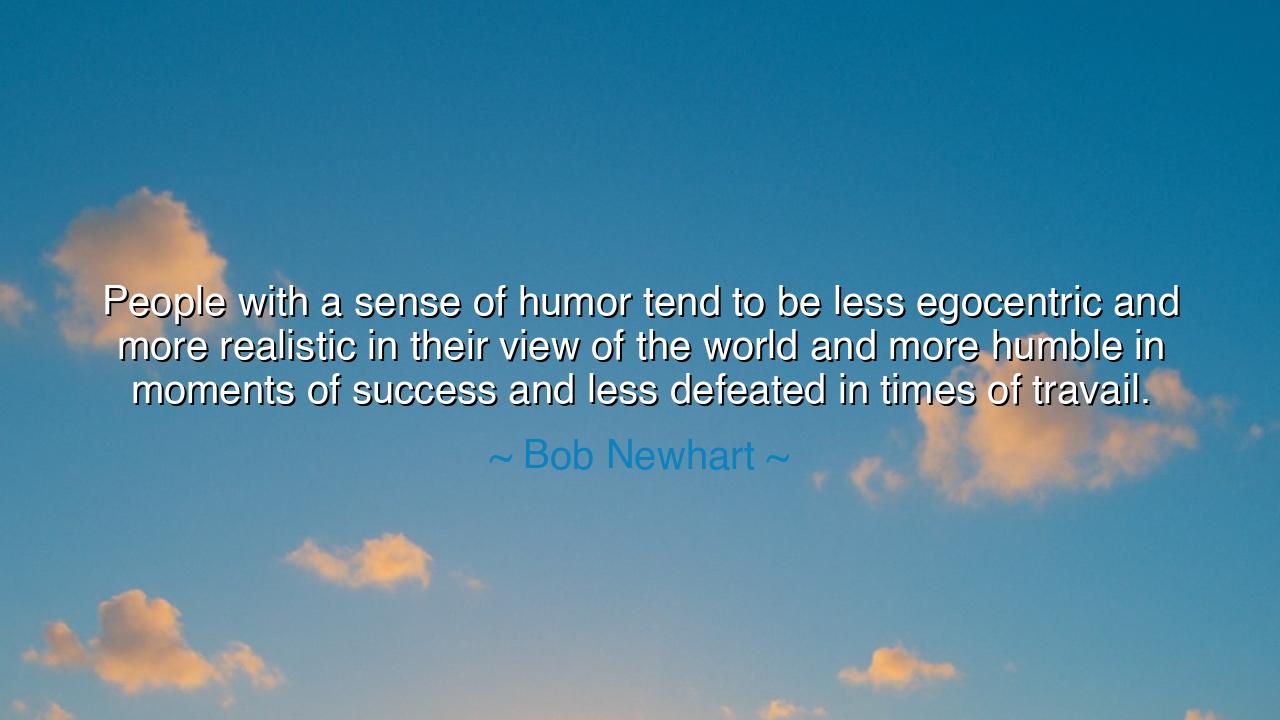
People with a sense of humor tend to be less egocentric and more
People with a sense of humor tend to be less egocentric and more realistic in their view of the world and more humble in moments of success and less defeated in times of travail.






When Bob Newhart said, “People with a sense of humor tend to be less egocentric and more realistic in their view of the world and more humble in moments of success and less defeated in times of travail,” he spoke of a wisdom both ancient and enduring: that humor is not merely amusement, but a lens through which the soul perceives truth. A person who can laugh is one who has stepped outside themselves, who can see life with clarity, and who is neither blinded by pride nor crushed by misfortune. Humor, in this sense, is a teacher, a guide, and a shield, shaping character as much as it shapes joy.
The ancients recognized humor as a hallmark of wisdom. Aristotle, in his discussions of ethics, emphasized moderation and self-awareness; he noted that those who understand themselves are less prone to arrogance and despair. Humor, as Newhart describes it, cultivates precisely these qualities. It diminishes egocentrism, for to laugh is to acknowledge one’s folly, one’s imperfection. It fosters realism, for a mind attuned to the absurdities of life is less likely to be deceived by illusion. And it instills humility, for the laughter that springs from awareness of one’s place in the world keeps the heart grounded amid triumph and tragedy alike.
Consider the life of Abraham Lincoln, whose humor was both subtle and profound. In moments of political tension and personal grief, he would tell stories, crack gentle jokes, and smile at the absurdities of his circumstances. His humor kept him humble when wielding immense power, and resilient when faced with defeat. Lincoln exemplifies Newhart’s observation: the laughter that springs from understanding transforms the individual, allowing them to remain realistic, balanced, and humane. Humor, in this way, becomes a moral compass, guiding action and thought alike.
Humor also grants strength in hardship. Those who possess it are less defeated in times of travail because they can perceive their trials with perspective. The Roman poet Juvenal once wrote of satire as a weapon against life’s absurdities: laughter allows men to endure what might otherwise break them. Similarly, Newhart suggests that humor buffers the spirit. By seeing the comedy hidden within struggle, one can navigate adversity without losing dignity, hope, or equilibrium. To laugh in sorrow is not to trivialize it, but to transcend it, to rise above circumstance while remaining fully engaged with reality.
Humor’s ability to temper pride and hubris is equally vital in moments of success. The Greek philosopher Diogenes lived simply, often using jest to mock those intoxicated by their own importance. To laugh at oneself is the highest humility, a recognition that achievement is fleeting and circumstance is capricious. Newhart’s insight mirrors this truth: those with a sense of humor do not inflate themselves upon success, for they understand the impermanence of fortune. Humor keeps the ego measured, the mind clear, and the spirit compassionate.
Moreover, humor is a bridge to connection. It fosters empathy, allowing the individual to see beyond their own perspective. When one laughs at life rather than clinging to self-importance, relationships flourish. Friends, colleagues, and communities are drawn to those who can see and share the absurdities of existence with grace. This aligns with the ancients’ understanding of laughter as both social and ethical: the wise use humor not to dominate or diminish, but to unify, enlighten, and heal.
The lesson, therefore, is both simple and profound: cultivate a sense of humor as one cultivates virtue. Let laughter guide your understanding of self and world. In moments of success, laugh at your own ambition and recognize the impermanence of achievement. In moments of hardship, seek the hidden absurdities and allow humor to sustain your spirit. By doing so, you become less egocentric, more realistic, and more resilient — a person in harmony with the rhythms of life.
In practical terms, this means observing life attentively, acknowledging folly — in oneself and in the world — and responding with levity. Share laughter generously, without malice, as a tool for humility, endurance, and perspective. As Bob Newhart reminds us, humor is not idle amusement; it is a moral, emotional, and spiritual discipline that shapes the heart, steadies the mind, and fortifies the soul, enabling us to navigate both triumph and travail with grace and dignity.






AAdministratorAdministrator
Welcome, honored guests. Please leave a comment, we will respond soon